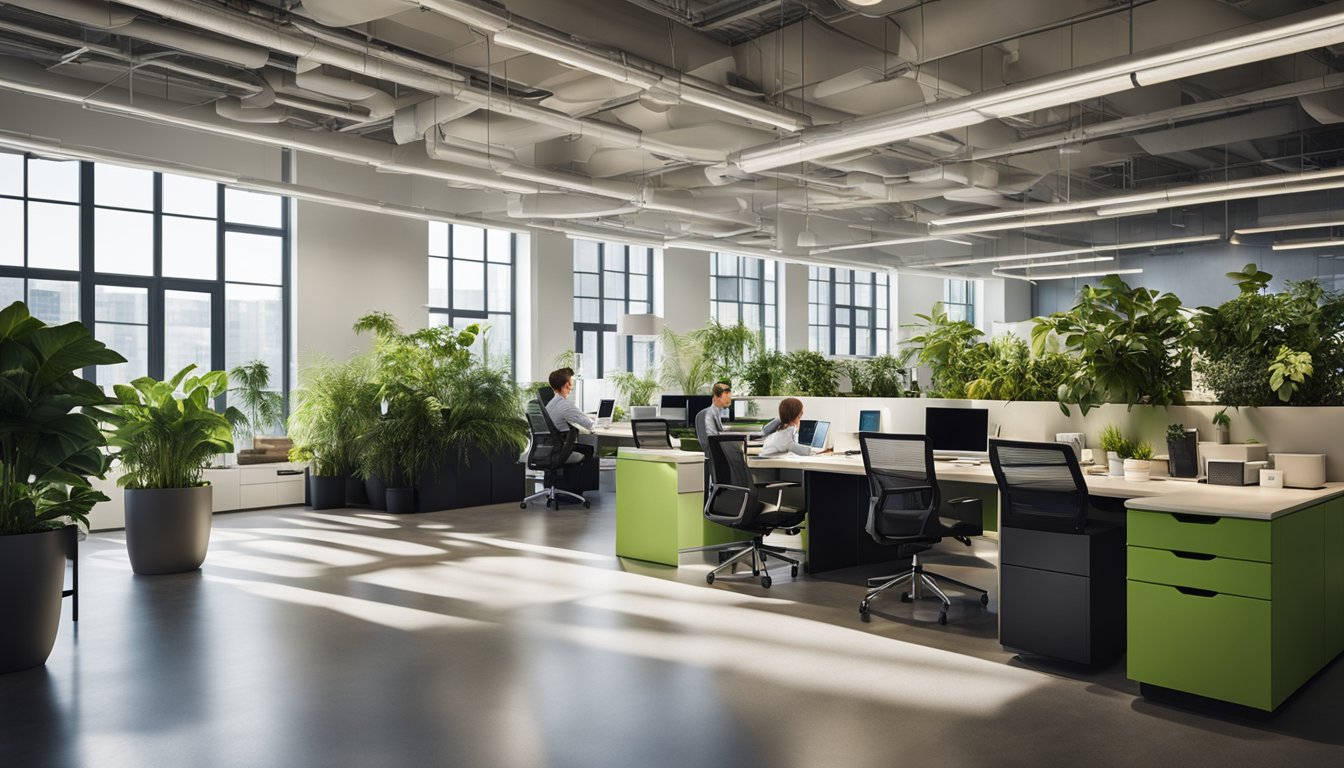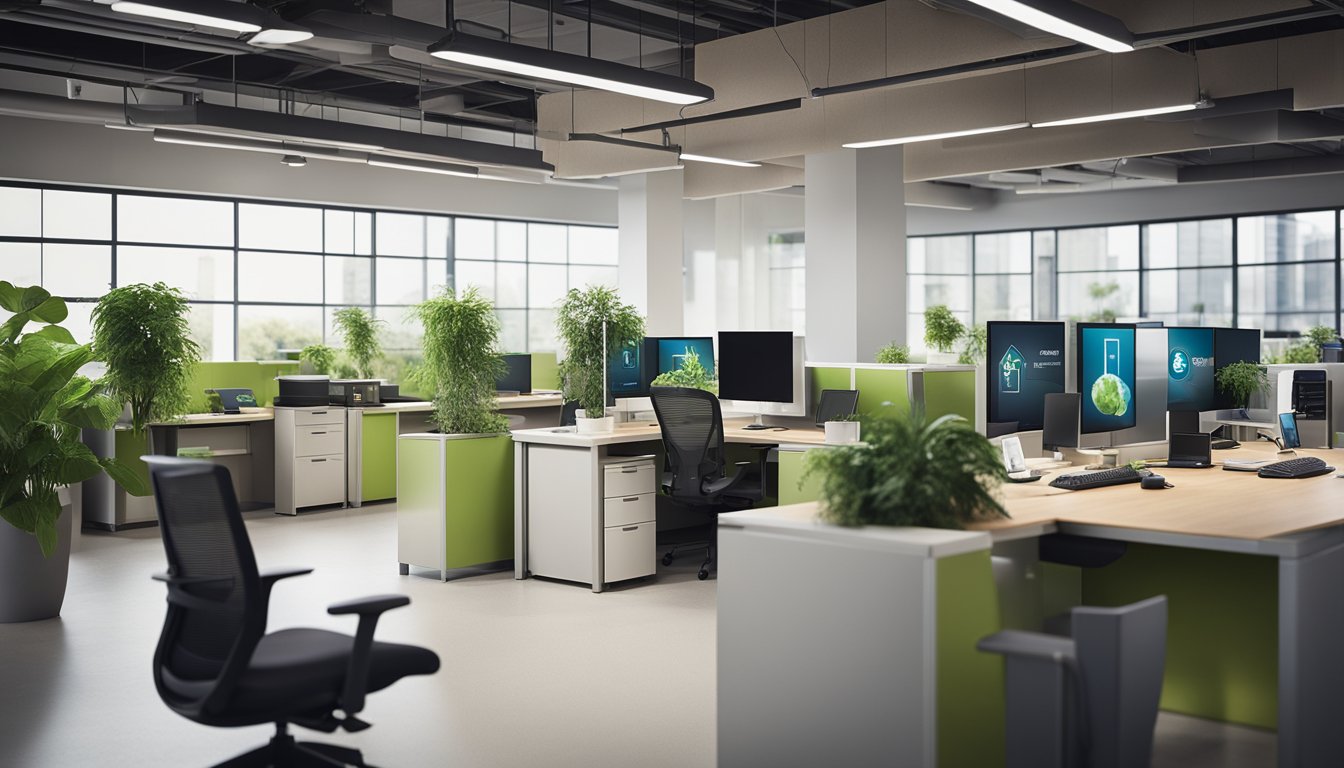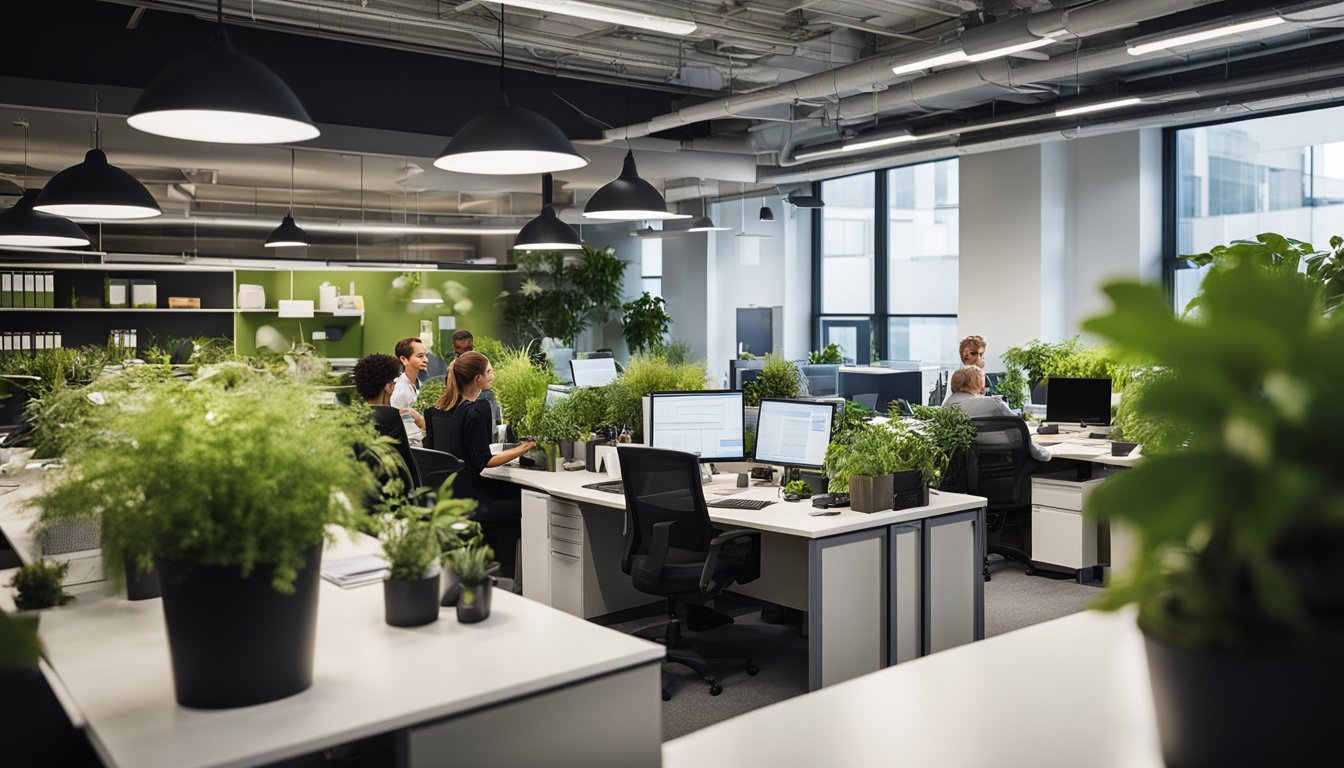Late updated: 18 Jan 2025 09:01
Written by: Amber Collins
Innovative Ways To Promote Sustainability In UK Offices: Practical Tips for Eco-Friendly Workspaces
Innovative strategies for sustainability in UK offices are crucial for both environmental impact and employee well-being. As businesses become increasingly aware of their ecological footprint, adopting green initiatives is no longer a choice but a necessity. From utilising sustainable office furniture to implementing energy-efficient practices, there are numerous ways we can lead the charge towards a more eco-friendly workspace.

Our journey towards a sustainable office begins with actionable solutions like reducing paper waste, enhancing energy efficiency, and promoting public transport over private vehicles. These strategies not only decrease environmental impact but also inspire a culture of eco-consciousness among employees. It's about fostering a workplace that prioritises sustainability, creating an environment where both productivity and the planet thrive.
The continuous evolution of workplace sustainability requires us to think creatively and embrace innovative practices. Emphasising a holistic approach, we should encourage recycling, adopt green building practices, and even rethink office snacks to include planet-friendly options. In an era where sustainability is pivotal, these initiatives play a vital role in shaping the future of our workplaces.
Key Takeaways
- Innovative strategies enhance workplace sustainability.
- Eco-friendly practices reduce environmental impact.
- Sustainable offices boost employee well-being.
Innovative Strategies for Energy Efficiency
Promoting sustainability in UK offices requires innovative strategies that prioritise energy efficiency. By implementing renewable energy solutions and optimising lighting, we can significantly reduce our carbon footprint and enhance the eco-friendliness of our workspaces.
Implementing Renewable Energy Solutions
Adopting renewable energy solutions is a vital step in achieving energy efficiency. Solar panels are a popular choice, converting sunlight into electricity and reducing dependence on non-renewable sources. Another effective strategy is the use of wind turbines, especially for office buildings located in windy areas. Harnessing green energy resources not only decreases operating costs but also promotes sustainable practices.
Moreover, using energy-efficient equipment, such as energy-efficient HVAC systems, helps in reducing overall energy consumption. These systems are designed to conserve energy while maintaining comfort within office environments. By concentrating on renewables and implementing these technologies, offices can significantly cut down their energy usage and contribute positively to environmental conservation efforts.
Optimising Natural Light and Efficient Lighting
Effective lighting solutions are crucial in reducing energy consumption. Natural light is the most energy-efficient option, so incorporating large windows or skylights can reduce the need for artificial lighting during the day. It also creates a more pleasant and productive work environment, benefiting employees.
Installing energy-efficient lighting such as LED bulbs can significantly reduce energy usage. These bulbs consume less electricity and have a longer lifespan compared to traditional lighting. Motion sensors are another smart addition, ensuring that lights are only on when a space is occupied. This technology minimises unnecessary energy use, allowing for better resource management and contributing to greener office practices.
Eco-Innovative Office Management and Waste Reduction

Eco-innovative office management focuses on reducing environmental impact through sustainable practices. By fostering sustainable procurement and improving waste management, we can significantly reduce waste. Emphasising remote work and sustainable commuting also supports these efforts.
Fostering Sustainable Procurement and Office Supplies
Sustainable procurement begins with choosing eco-friendly office supplies. We should prioritise products made from recycled materials such as recycled paper and reusable pens. Opting for recycled or compostable packaging reduces single-use plastics.
Moreover, implementing a paperless document system minimises paper waste. Digital tools and cloud storage offer alternatives to printed documents. It’s essential to educate our team on selecting sustainable office supplies to ensure consistency in our eco-friendly initiatives.
Advancing Recycling and Waste Management Programmes
Establishing comprehensive recycling programmes is key to reducing office waste. We can start by positioning clearly labelled recycling bins throughout the office to encourage recycling of paper, plastics, and metals. Composting food waste is another effective strategy.
Regular waste audits help us understand waste patterns and target problem areas. By promoting the “reduce, reuse, recycle” mindset, we can further enhance our waste management approach. Encouraging staff participation ensures the success and longevity of these schemes.
Promoting Sustainable Commuting and Remote Work Practices
Sustainable commuting options such as cycling to work or using public transport significantly reduce our impact. Providing incentives for eco-friendly commuting can motivate employees to choose green alternatives.
Remote work and hybrid working arrangements are increasingly popular and beneficial. By reducing commuter traffic, we not only cut emissions but also provide flexible work options. Encouraging a blend of in-office and remote work helps optimise space and energy usage.
These strategies combine to foster an environment that underscores our commitment to sustainability while enhancing employee satisfaction.
Frequently Asked Questions

We've compiled some common queries about implementing sustainability in UK offices, focusing on practical actions, creative initiatives, examples of success, and proven strategies.
What practical steps can UK offices take to improve environmental sustainability?
UK offices can implement energy-saving technologies and improve waste management systems to reduce environmental impact. Encouraging the use of public transport and facilitating remote work are also effective measures. Additionally, offices can adopt renewable energy sources and maximise natural lighting to enhance sustainability efforts.
Could you list creative initiatives for promoting a 'go green' culture in the workplace?
Forming employee-led green teams can drive engagement and innovation. Hosting sustainability workshops and friendly competitions helps raise awareness. Incentivising green commuting options and introducing plant-friendly spaces are creative ways to instil a green culture.
What are some examples of sustainability in action within the workplace environment?
Incorporating recycling stations, using energy-efficient appliances, and opting for paperless communication are actionable steps. Simple practices like establishing office gardens or using sustainable office supplies can visibly demonstrate commitment to sustainability.
How can businesses incorporate the Five 'C's of sustainability into their office practices?
Collaboration involves working with stakeholders to achieve shared sustainability goals. Consistency ensures actions align with sustainability commitments. Circulation focuses on resource efficiency. Creativity drives innovative solutions, and Communication effectively shares sustainability achievements.
In what ways can office environments in the UK contribute to national sustainability goals?
By reducing carbon footprints and energy consumption, workplaces can play a significant role. Implementing government-recommended practices and participating in national sustainability programmes also align office efforts with broader goals.
What strategies are effective in embedding sustainability into corporate operations?
Embedding sustainability necessitates setting clear, measurable goals and regularly reviewing progress. Integrating sustainability into corporate values and ensuring leadership support is critical. Offering training and development for staff can further reinforce sustainability as a core business principle.
